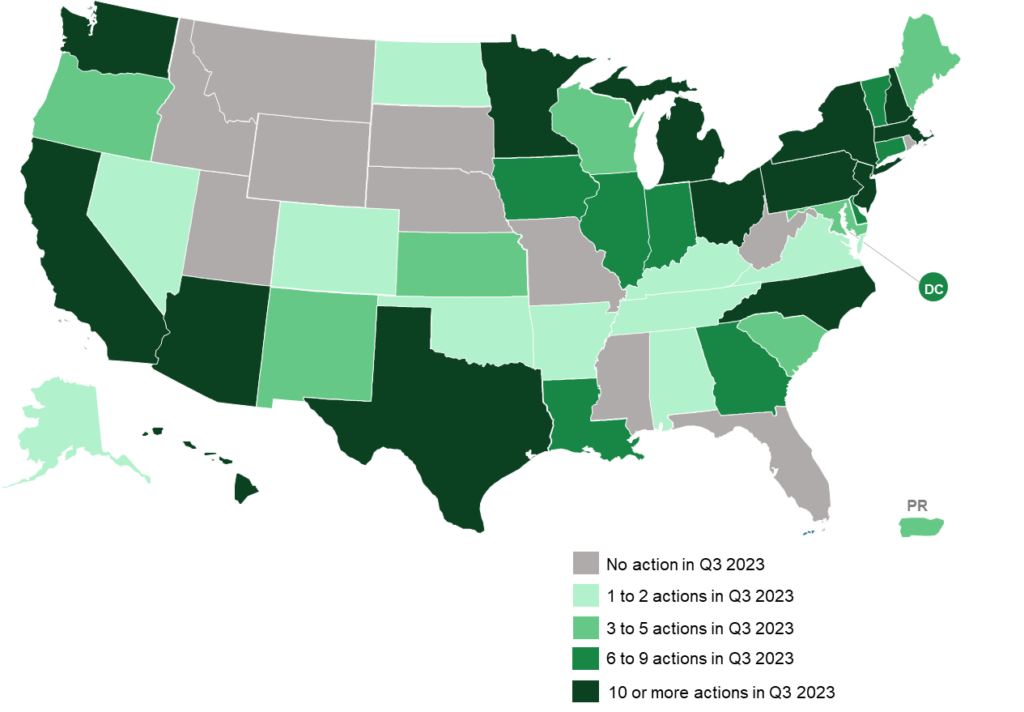The 50 States of Electric Vehicles: States Consider Utility Ownership of Charging Infrastructure and Demand-Side Management Programs in Q3 2023
Raleigh, NC – (November 1, 2023) The N.C. Clean Energy Technology Center (NCCETC) released its Q3 2023 edition of The 50 States of Electric Vehicles. The quarterly series provides insights on state regulatory and legislative discussions and actions on electric vehicles and charging infrastructure.
The report finds that 39 states, plus the District of Columbia and Puerto Rico took actions related to electric vehicles and charging infrastructure during Q3 2023 (see figure below), with the greatest number of actions relating to rebate and grant programs; rate design for electric vehicle charging; charging infrastructure planning activities; state procurement of electric vehicles; and registration, mileage, or charging fees for electric vehicles. States also continued to take actions planning for National Electric Vehicle Infrastructure (NEVI) program funding distribution.
A total of 430 electric vehicle actions were taken during Q3 2023, with the most active states being Massachusetts, New York, New Jersey, California, Minnesota, North Carolina, and Hawaii. So far in 2023, 29 states have enacted legislation related to transportation electrification, as of late October 2023.
Q3 2023 State and Utility Action on Electric Vehicles

The report discusses three trends in electric vehicle actions taken in Q3 2023: (1) lawmakers considering bills restricting transportation electrification policies, (2) regulators addressing utility ownership of charging infrastructure, and (3) utilities integrating electric vehicle charging programs into broader demand-side management portfolios.
“The past quarter featured steps forward and backward as states grapple with the best roles for utilities and state agencies to play in advancing the market for electric vehicles ,” said Brian Lips, Senior Project Manager at NCCETC.
The report notes five of the top policy developments of the quarter:
- Delaware lawmakers passing multiple transportation electrification bills;
- New York launching its Charge Ready NY 2.0 program;
- North Carolina regulators approving Duke Energy’s charging-as-a-service program;
- Hawaii legislators adopting a transportation emission reduction target; and
- Connecticut regulators opening emissions standard and electrification target rulemakings.
“Utilities are integrating electric vehicle issues into broader programs, like demand-side management, creating a more holistic response to changes in electricity usage,” observed Rebekah de la Mora, Policy Analyst at NCCETC. “Managed charging programs provide similar grid benefits compared to more “traditional” thermostat-based demand response programs.”
View the 50 States of Electric Vehicles 2023 Q3 Quarterly Report Executive Summary
View and Purchase the 50 States of Electric Vehicles 2023 Q2 Update FULL Report
View other 50 States Reports – Solar, Grid Modernization , Electric Vehicles and Decarbonization
ABOUT THE N.C. CLEAN ENERGY TECHNOLOGY CENTER
The N.C. Clean Energy Technology Center, as part of the College of Engineering at North Carolina State University, advances a sustainable energy economy by educating, demonstrating and providing support for clean energy technologies, practices and policies. It serves as a resource for innovative, sustainable energy technologies through technology demonstration, technical assistance, outreach and training. For more information about the Center, visit: http://www.nccleantech.
Media Contact, Shannon Helm, NCCETC, shannon_helm@ncsu.edu